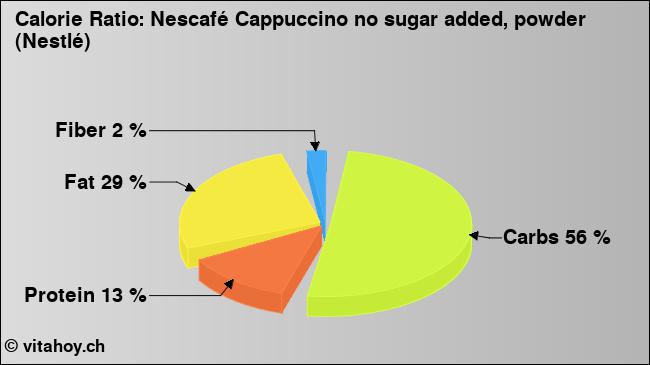Nutrition values of Nescafé Cappuccino no sugar added, powder (Nestlé)
according to Swiss Food Composition Database FSVO v5.3
Not the right food? Find other foods
The following nutrition values are sourced from: Swiss Food Composition Database FSVO v5.31.
Nutrition values
Amount per 100g (edible portion)
Nutrition Facts
Detailed Values
Energy
Amount per 100g (edible portion)
Daily Value %*
Energytotal energy
405
kcalkilocalorie
Energytotal energy
1700
kjkilojoule
Carbohydrates
Amount per 100g (edible portion)
Daily Value %*
Carbohydrates
56.20
ggram
Sugarstotal
30.90
ggram
Dietary fibertotal dietary fiber
4.8
ggram
Fat
Amount per 100g (edible portion)
Daily Value %*
Fat
12.90
ggram
Fatty acids, total saturated
11.700
ggram
An empty value in the table means that no value is available and nothing is being said about it. 0 / 0.0 / 0.000 means that the nutrient is not contained at all or only in slight amounts.
The table above contains values from the following nutrition databases.
Notices
* Calculating the percentages of daily intake are for a 45 year old person and the average of man and woman. For the calculation the recommended dietary allowance (RDA) is used and, if not available, estimates of adequate intake (AI) or estimates of average requirement (EAR) are used.
** Calculated with the following factors: carbohydrates 4 kcal/g, proteins 4 kcal/g, fat 9 kcal/g, fibers 2 kcal/g, alcohol 7 kcal/g.
Sources
1
Eidgenösisches Departement des inneren EDI. Bundesamt für Lebensmittelsicherheit und Veterinärwesen BLV. (2017). Schweizer Nährwertdatenbank. (Version 5.3 vom 30.03.2017). Retrieved from http://www.naehrwertdaten.ch/request?xml=MessageData&xml=MetaData&xsl=Download&lan=de&pageKey=Start at 2018-12-23.
